MercoPress. South Atlantic News Agency
Fisheries
-
Thursday, December 6th 2007 - 20:00 UTC
Uruguay fisheries exports to reach 196 million dollars

Uruguay fisheries exports in 2007 are expected to reach 196 million US dollars, according to the latest estimates from Daniel Montiel, head of the National Directorate of Aquatic Resources.
-
Sunday, December 2nd 2007 - 20:00 UTC
Argentine fishing industry warns about excessive costs
The Argentine fisheries industry and unions have warned that the coming squid and prawn seasons are imperiled because of the drop in international prices and rising domestic costs.
-
Friday, November 30th 2007 - 20:00 UTC
WTO moves to impose tough limit on fisheries subsidies
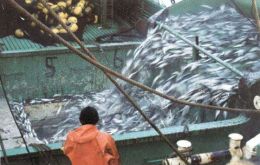
New negotiating proposals at the World Trade Organization (WTO) on Friday impose tough limits on subsidies on fisheries, a move that delighted environmentalists concerned about over-fishing.
-
Thursday, November 29th 2007 - 20:00 UTC
Argentine fisheries exports drop in volume and value
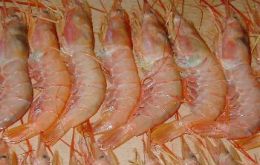
Argentine fish and shellfish exports during the first ten months of 2007 dropped 14% in volume and 15% in value compared to the same period a year ago, according to statistics from the National Food Safety and Quality Service (SENASA).
-
Thursday, November 29th 2007 - 20:00 UTC
Chile implements an early red tide alert system
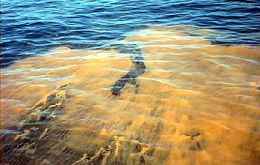
Chile is implementing an early alert system to detect Red Tide (mr-SAT) that should be operational beginning January 2008 was announced Wednesday by the country's National Fisheries Service (SERNAPESCA).
-
Tuesday, November 27th 2007 - 20:00 UTC
Argentine jigger fleet complains about soaring costs
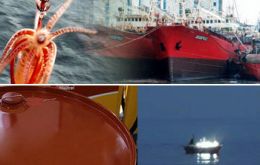
The decline in squid prices along with a rise in operation costs has made Argentine jigger vessels shipowners anxious about their situation, according to the new head of the Argentine Chamber of Jigger Fishing Vessels Shipowners (CAPA), Fernando Georgiadis.
-
Monday, November 26th 2007 - 20:00 UTC
Falklands fisheries: ban looms on high seas bottom trawling
THE proposal for a ban on high seas bottom trawling has caused some concern among members of the fishing industry at the Falkland Islands.
-
Wednesday, November 21st 2007 - 20:00 UTC
Amazon basin strayed minke whale was found dead
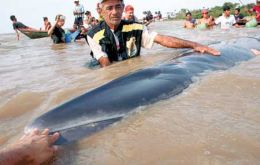
A minke whale that had strayed deep into the Amazon rainforest has been found dead. The 5.5 meters whale was believed to have become lost in the Amazon's many tributaries after leaving the Atlantic more than 1.600 kilometers away.
-
Tuesday, November 20th 2007 - 20:00 UTC
FAO: Aquaculture only way to meet future fish demand
The farming of fish under controlled conditions is the only way to meet future global demand, the United Nations Food and Agriculture Organization FAO said on Monday estimating that rising population numbers mean that by 2030 an additional 37 million tons of fish will be needed to maintain current levels of consumption.
-
Tuesday, November 20th 2007 - 20:00 UTC
US joins world criticism of Japan's whale hunt season

United Stated has added its voice to international criticism of Japan's largest-ever whaling expedition. The UK, Australia and New Zealand have already urged Japan to call off this year's hunt, which will target humpback whales for the first time in decades.
